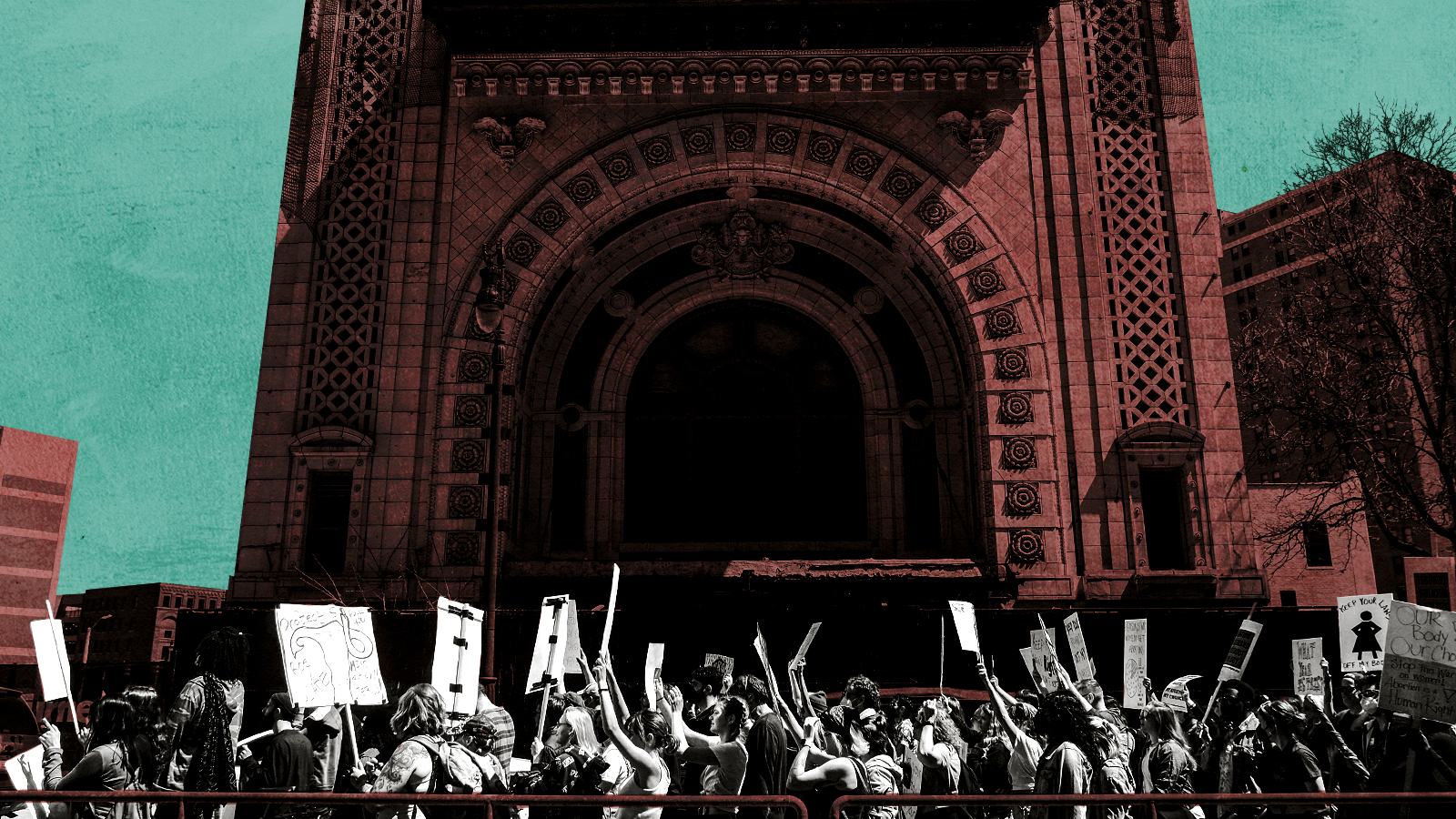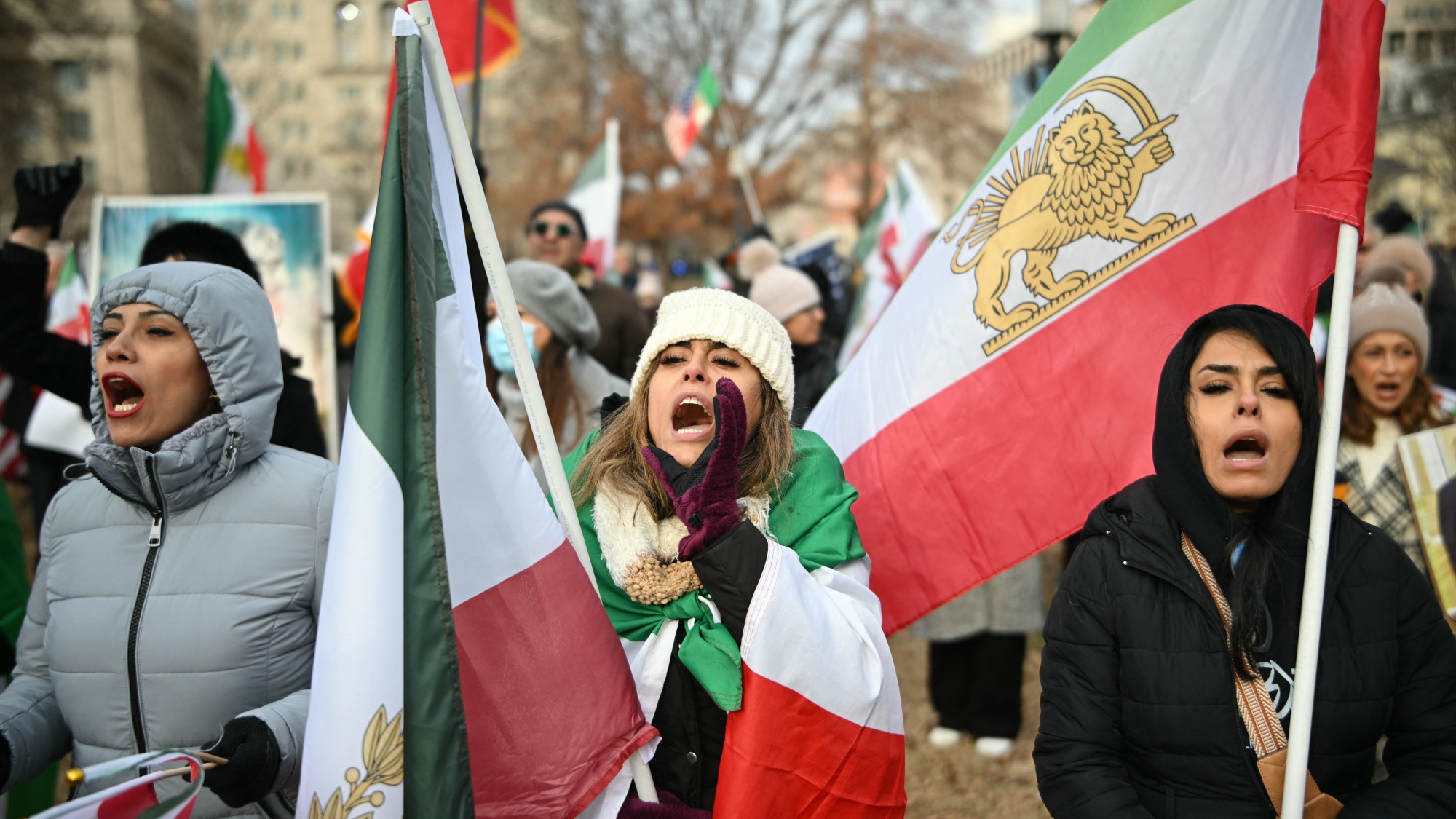Is it legal to protest outside a justice's home?
The sharpest opinions on the debate from around the web


A free daily email with the biggest news stories of the day – and the best features from TheWeek.com
You are now subscribed
Your newsletter sign-up was successful
Last week, abortion rights advocates protested outside the homes of conservative Supreme Court justices, and more protests are scheduled for this week. Not everyone was thrilled with the idea:
1. Protesting is important, but keep it civil
Writing for The New York Times, Jay Caspian Kang argued that protests are essential, even if they have little hope of achieving immediate success in the realm of public policy. "[T]he goal is to create an event in which people who are outraged can gather together. Within that space, connections are made, new ideas are tested, and the infrastructure for political action gets built," he wrote. "The thousands who show up to these protests should be applauded for what is fundamentally a patriotic and hallowed act," Kang added.
Others chimed in to urge protesters to refrain from violence.
The Week
Escape your echo chamber. Get the facts behind the news, plus analysis from multiple perspectives.

Sign up for The Week's Free Newsletters
From our morning news briefing to a weekly Good News Newsletter, get the best of The Week delivered directly to your inbox.
From our morning news briefing to a weekly Good News Newsletter, get the best of The Week delivered directly to your inbox.
On Friday, Fox News reporter Peter Doocy asked White House Press Secretary Jen Psaki if she was willing to condemn the activists who released the home addresses of the Supreme Court justices. "Look, I think the president's view is that there's a lot of passion, a lot of fear, a lot of sadness from many, many people across this country about what they saw in that leaked document," Psaki said. "We obviously want people's privacy to be respected. We want people to protest peacefully if they want to [protest]."
When Doocy followed up about protests in front of the justices' homes, Psaki quipped that she was not aware of "an official U.S. government position on where people protest."
In Reason, Robby Soave wrote that "[t]he street and sidewalk are public spaces, and it's legally permissible to protest there. The First Amendment rightly protects Americans whose displeasure with their government's policies compels them to engage in free expression — even if the form that expression takes is hostile and unpleasant."
"[T]here is no right enjoyed by government actors to avoid witnessing protests," Soave added.
A free daily email with the biggest news stories of the day – and the best features from TheWeek.com
2. Turn up the heat!
When Bill Kristol of The Bulwark took to Twitter urging demonstrators to refrain from protesting at private homes and places of worship, many users responded with derision. "Would you say a uterus is more, or less, private than a house?" asked journalist Heidi Moore.
Lindsey Boylan, one of the women who accused former New York Gov. Andrew Cuomo (D) of sexual misconduct, also responded to Kirstol. "Translation: Don't be discourteous as people undermine your human rights. Don't make the powerful uncomfortable in their community as they harm you intentionally," she wrote.
Democratic strategist Max Burns wrote that conservatives "condemning the peaceful protesting outside Justice Kavanaugh's home" were "absolutely silent when Christine Blasey Ford had to actually move because right-wing cranks were sending death threats right to her front door." Ford wrote that she moved four times amid the controversy around Kavanaugh, and journalists gathered at her residence, but no protests were reported outside her home during Kavanaugh's 2018 confirmation hearings.
Other users claimed that objections to abortion rights protests outside private homes are hypocritical because pro-lifers routinely confront employees and patients outside abortion clinics.
3. Protesting outside private homes crosses a line
At a conference held Friday, Justice Clarence Thomas — one of the justices who voted to overturn Roe — said the Supreme Court "can't be an institution that can be bullied into giving you just the outcomes you want."
Many conservative commentators argued that leaking the draft decision and protesting outside justices' homes constituted attempts to do just that.
Michael Knowles of The Daily Wire said that, by refusing to condemn those protests, Psaki had essentially told conservative Supreme Court justices to "eff around and find out," implying they had brought the outrage on themselves. Top Democrats, Knowles said, are "shrugging their shoulders when their own fellow partisans send angry mobs to intimidate judges' families."
Oh his popular Fox News show, Tucker Carlson argued that, according to federal law, anyone who "with the intent of influencing any judge, juror, witness, or court officer, in the discharge of his duty, pickets or parades in or near a building housing a court of the United States or in or near a building or residence occupied or used by such judge, juror, witness, or court officer" could be fined or imprisoned.
Law professor Eugene Volokh wrote in Reason that Carlson is correct, drawing attention to the 1965 Supreme Court case Cox v. Louisiana, which upheld a similar ban. The majority opinion in that case insisted that "mob law is the very antithesis of due process" and that picketing outside courtrooms and judges' homes with the intent to influence decisions "infringes a substantial state interest in protecting the judicial process."
To enforce this law, prosecutors would need to prove that the protesters intended to influence a court's decision, not merely to express outrage about said decision. The fact that the leaked decision is not yet final makes the influence case stronger than it ordinarily might be.
Grayson Quay was the weekend editor at TheWeek.com. His writing has also been published in National Review, the Pittsburgh Post-Gazette, Modern Age, The American Conservative, The Spectator World, and other outlets. Grayson earned his M.A. from Georgetown University in 2019.
-
 Political cartoons for February 15
Political cartoons for February 15Cartoons Sunday's political cartoons include political ventriloquism, Europe in the middle, and more
-
 The broken water companies failing England and Wales
The broken water companies failing England and WalesExplainer With rising bills, deteriorating river health and a lack of investment, regulators face an uphill battle to stabilise the industry
-
 A thrilling foodie city in northern Japan
A thrilling foodie city in northern JapanThe Week Recommends The food scene here is ‘unspoilt’ and ‘fun’
-
 How did ‘wine moms’ become the face of anti-ICE protests?
How did ‘wine moms’ become the face of anti-ICE protests?Today’s Big Question Women lead the resistance to Trump’s deportations
-
 Supreme Court upholds California gerrymander
Supreme Court upholds California gerrymanderSpeed Read The emergency docket order had no dissents from the court
-
 ‘My donation felt like a rejection of the day’s politics’
‘My donation felt like a rejection of the day’s politics’Instant Opinion Opinion, comment and editorials of the day
-
 Is Alex Pretti shooting a turning point for Trump?
Is Alex Pretti shooting a turning point for Trump?Today’s Big Question Death of nurse at the hands of Ice officers could be ‘crucial’ moment for America
-
 Minnesota roiled by arrests of child, church protesters
Minnesota roiled by arrests of child, church protestersSpeed Read A 5-year-old was among those arrested
-
 How Iran protest death tolls have been politicised
How Iran protest death tolls have been politicisedIn the Spotlight Regime blames killing of ‘several thousand’ people on foreign actors and uses videos of bodies as ‘psychological warfare’ to scare protesters
-
 Unrest in Iran: how the latest protests spread like wildfire
Unrest in Iran: how the latest protests spread like wildfireIn the Spotlight Deep-rooted discontent at the country’s ‘entire regime’ and economic concerns have sparked widespread protest far beyond Tehran
-
 The billionaires’ wealth tax: a catastrophe for California?
The billionaires’ wealth tax: a catastrophe for California?Talking Point Peter Thiel and Larry Page preparing to change state residency
